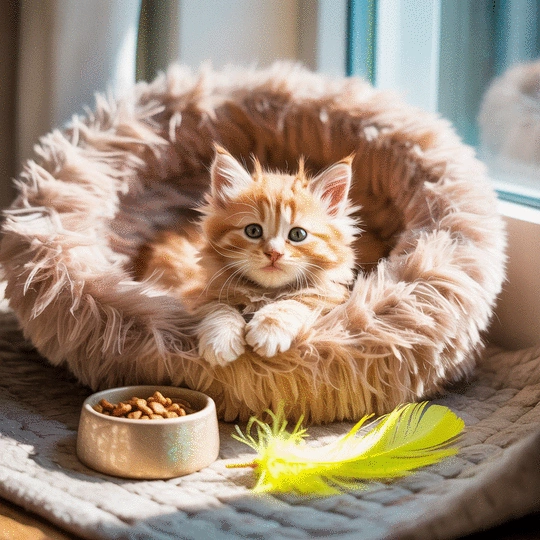Choosing the Right Kitten Food
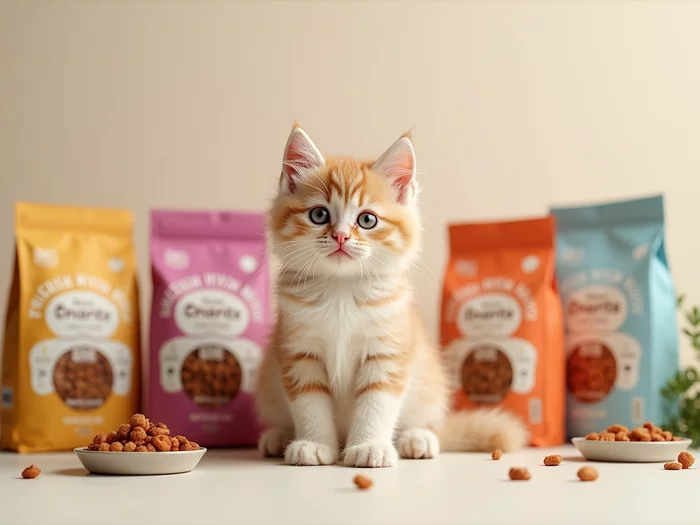
Posted on: 2025-10-11
By: Edyta Drabek
Choosing the right food for your kitten is more than just a daily chore—it's an essential step toward ensuring a healthy, happy life for your new furry friend. With so many options available, how do you make the best choice? Let's explore the critical insights that will guide you in providing the best nutrition for your playful companion.
What You Will Learn
- Kittens require high-quality food specifically formulated for their growth, rich in protein and fat.
- Hydration is crucial; always provide clean, fresh water to support digestion and overall health.
- Understand the benefits of wet versus dry kitten food to cater to your kitten's needs and preferences.
- Monitor your kitten’s growth and energy levels to determine when to transition to adult cat food.
- Research brands and evaluate nutritional content to make informed choices that balance cost and quality.
Key Stages of Kitten Nutritional Needs and Transition
Understanding a kitten's evolving dietary requirements from birth to adulthood is crucial for their healthy development. The visual below outlines the nutritional stages and feeding transitions.
Navigating the Nutritional Needs of Kittens
As a new kitten parent, you may find yourself asking, “What do I feed my little furball for a healthy start?” That's a fantastic question! Understanding your kitten's nutritional needs is crucial for their growth and development. At Kittie Care Central, we want to simplify this journey for you, ensuring your kitten thrives during those critical early months.
To kick things off, let’s dive into the basics of kitten nutrition, which is essential for their overall health. High-quality food tailored for kittens contains the right mix of nutrients, ensuring they get what they need to grow strong and playful!
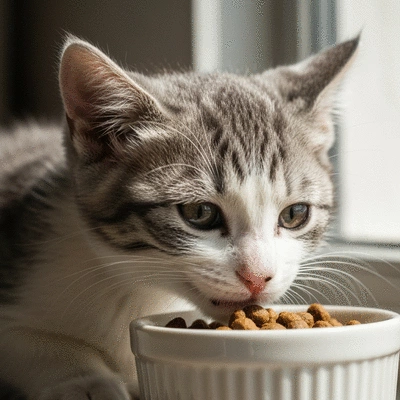
Understanding Kitten Nutrition Basics
Before we delve into specifics, it’s important to grasp the foundation of kitten nutrition. Kittens have unique dietary requirements compared to adult cats due to their rapid growth. Here are the key components:
- Protein: Vital for muscle development and overall health.
- Fat: Provides energy and supports brain development.
- Vitamins and Minerals: Ensure all bodily functions operate smoothly.
These essentials set the stage for a healthy and happy kitten! Now, let’s talk about some specific dietary requirements.
Key Dietary Requirements for Healthy Growth
Your kitten needs a balanced diet rich in quality ingredients. It’s essential to choose food that is specifically formulated for their life stage. Look for labels that mention "kitten food"! These products typically contain higher levels of protein and fat, which are crucial for their growth spurts.
Moreover, hydration is just as important as nutrition. Make sure your kitten has access to clean, fresh water at all times. This helps with digestion and supports overall health.
Importance of Protein and Fat in Kitten Diets
Protein and fat play starring roles in your kitten's diet. Protein helps build strong muscles and is necessary for healthy organ function. It’s the building block of life! You’ll want to choose foods that list a high-quality protein source, such as chicken or fish, as the first ingredient.
Similarly, fats are essential for energy and help absorb certain vitamins. They’re also important for your kitten’s skin and coat health. Opt for foods that include sources of omega fatty acids, which promote healthy fur and skin.
Nutritional Value of Wet vs. Dry Kitten Food
Deciding between wet and dry kitten food can feel overwhelming, but both have their benefits! Here’s a quick breakdown:
- Wet Food: Higher moisture content, which helps keep kittens hydrated and can be more palatable.
- Dry Food: Convenient and helps maintain dental health by reducing plaque buildup.
Many kitten parents find a combination of both works best, providing the benefits of moisture and crunch! After all, keeping things interesting for your little one is key to their happiness.
Transitioning Through Life Stages
As your kitten grows, their nutritional needs will change. Gradually transitioning from kitten food to adult cat food is important, but when is the right time? Let’s explore what to consider during this transition.
What to Consider When Moving from Kitten to Adult Food
When your kitten reaches around one year of age, it’s time to start thinking about transitioning to adult food. Look for signs of readiness, such as slowing down in growth and a decrease in energy levels. Remember, not all kittens will be ready at the same time! It’s best to consult your veterinarian to make an informed decision.
Signs Your Kitten is Ready for Adult Nutrition
Some signs that your kitten might be ready for adult food include:
- Age: Typically around 12 months
- Weight: Achieving their ideal weight
- Energy: A noticeable drop in their playful antics
Pay attention to these cues, as they can guide you in making the right choice for your growing feline!
Feeding Guidelines Throughout Kitten Growth Stages
During those first few months, it’s essential to follow feeding guidelines based on your kitten’s age:
- 0-4 months: Three to four meals a day.
- 4-6 months: Gradually reduce to three meals daily.
- 6-12 months: Transition to two meals a day as they approach adulthood.
Following these guidelines ensures your kitten receives the right amount of nutrition to support their growth and energy needs.
Interactive Poll: What's Your Kitten's Favorite Food?
As you embark on this journey of kitten care, we want to hear from you! What type of food does your kitten seem to enjoy the most? Share your thoughts and experiences below:
Frequently Asked Questions About Kitten Nutrition
- What are the most important nutrients for a growing kitten?
- Kittens require a diet rich in high-quality protein for muscle development, healthy fats for energy and brain development, and essential vitamins and minerals for overall bodily functions. Food specifically labeled "kitten food" is formulated to meet these needs.
- How often should I feed my kitten?
- Feeding frequency varies with age: 0-4 months, 3-4 meals/day; 4-6 months, gradually reduce to 3 meals/day; 6-12 months, transition to 2 meals/day as they approach adulthood.
- What are the benefits of wet versus dry kitten food?
- Wet food has a higher moisture content, aiding hydration and often being more palatable. Dry food is convenient and can help maintain dental health by reducing plaque buildup. Many owners find a combination of both works best.
- When should I transition my kitten to adult cat food?
- Most kittens are ready to transition to adult food around 12 months of age. Look for signs like slowing growth and decreased energy levels. It's always best to consult your veterinarian for personalized advice.
- How can I ensure my kitten stays hydrated?
- Always provide access to clean, fresh water. Wet food also contributes significantly to a kitten's daily hydration intake.
- What should I look for when choosing a high-quality kitten food?
- Look for food specifically formulated for kittens with real meat as the first ingredient. Avoid excessive fillers or artificial additives, and consider brands that meet AAFCO standards for complete nutrition. For more details on proper nutrition for cats, consult reliable veterinary resources.
Summarizing Key Takeaways on Kitten Food Selection
As a first-time kitten parent, it’s crucial to make informed choices for your kitten's health. We've covered a lot about the various aspects of kitten nutrition, and now it's time to summarize the key points you should keep in mind. Choosing the right food can significantly impact your kitten’s growth and overall well-being. Let’s break it down!
When selecting kitten food, you’ll want to consider factors like cost, quality, and nutritional content. Striking a balance between these elements ensures that you’re not only providing the best for your furry friend but also keeping your budget in check. Remember, investing in high-quality food now can save you from health issues down the road!

Making Informed Choices for Your Kitten's Health
Making informed decisions about your kitten's diet is essential for their growth and health. Here’s a handy list of key considerations:
- Research brand reputation and customer feedback before making a purchase.
- Check for essential nutrients like protein and fats in the ingredients list.
- Evaluate the cost versus the quality of the food.
- Stay updated on ongoing research about kitten nutrition.
As you can see, there's a lot to think about! Staying educated on these factors will help you feel confident in your choices. At Kittie Care Central, our mission is to empower you with the knowledge you need, so you can provide the best for your kittens!
Balancing Cost with Quality in Kitten Nutrition
Finding the right balance between cost and quality can feel overwhelming at times. It’s tempting to go for the cheapest option, but remember that kitten nutrition is about more than just price. High-quality food often contains better ingredients that can support healthy growth and development. For example:
- Look for options that contain real meat as the first ingredient.
- Avoid brands with excessive fillers or artificial additives.
- Consider food that meets AAFCO standards for complete nutrition.
By keeping these tips in mind, you’ll ensure that your kitten gets the best nutrition without breaking the bank!
Staying Informed: The Importance of Ongoing Research
The world of pet nutrition is always evolving, and it’s important to stay informed. Following trusted resources, such as Kittie Care Central, can help you keep up with the latest findings and recommendations. Regularly check for updates on:
- New ingredient trends and their benefits for kittens.
- Changes in nutritional guidelines from pet nutrition experts.
- Emerging brands that focus on quality and sustainability.
Research can guide your choices, ensuring you’re providing the best diet for your growing kitten!
Understanding Price Comparison and Budgeting for Kitten Food
When budgeting for kitten food, it’s beneficial to compare prices across various brands. Here are a few tips to help you navigate this process:
- Set a monthly budget for pet food expenses.
- Use online price comparison tools to find the best deals.
- Consider buying in bulk for savings on high-quality food.
By being strategic about your purchases, you can maintain quality while managing expenses effectively.
Encouraging Engagement and Further Exploration
Now that you’re equipped with the knowledge to choose the right food for your kitten, I’d love to hear about your experiences! Join the discussion and share your stories with fellow pet owners about what worked for you and what didn't.
Join the Discussion: Share Your Kitten Food Experiences
Connecting with other pet owners can provide valuable insights into different kitten diets. Here’s how you can get involved:
- Join online forums or social media groups dedicated to kitten care.
- Share your recommendations and seek advice from others.
- Participate in local pet events to meet like-minded owners.
These interactions can offer new perspectives and tips that enhance your journey as a kitten parent!
Resources for Continued Learning on Pet Nutrition
To keep your knowledge fresh and relevant, consider exploring these resources:
- The Cat Bible: Everything Your Cat Expects You to Know by Anitra Frazier
- Websites like PetMD and The Cornell Feline Health Center, which offers comprehensive information on feeding your cat.
- Follow trusted pet nutrition blogs and join their newsletters.
Staying informed can empower you as a pet owner, ensuring your kitten has the best start in life. Happy reading!
Recap of Key Points
Here is a quick recap of the important points discussed in the article:
- High-Quality Kitten Food: Always choose food specifically formulated for kittens that contains essential nutrients like protein and fat.
- Hydration Matters: Ensure your kitten has access to clean, fresh water at all times to support digestion and overall health.
- Wet vs. Dry Food: A combination of wet and dry food can provide the benefits of hydration and dental health.
- Transitioning to Adult Food: Transition your kitten to adult cat food around one year of age, based on signs of readiness.
- Follow Feeding Guidelines: Adjust feeding frequency based on your kitten's age to ensure proper nutrition during growth stages.
- Stay Informed: Regularly research and keep updated on kitten nutrition to make informed decisions for your pet's health.
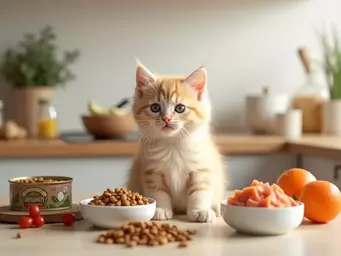 As you embark on the journey of kitten parenting, understanding your little furball's nutritional ne
As you embark on the journey of kitten parenting, understanding your little furball's nutritional ne
 As you embark on the rewarding journey of kitten parenthood, understanding the significance of choos
As you embark on the rewarding journey of kitten parenthood, understanding the significance of choos
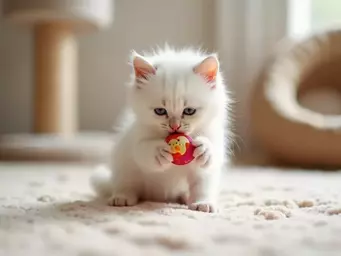 Early training is not just a phase; it's a cornerstone of a kitten's lifelong behavior and well-bein
Early training is not just a phase; it's a cornerstone of a kitten's lifelong behavior and well-bein
